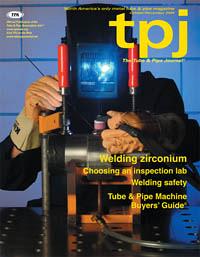Contributing Writer
- FMA
- The Fabricator
- FABTECH
- Canadian Metalworking
Categories
- Additive Manufacturing
- Aluminum Welding
- Arc Welding
- Assembly and Joining
- Automation and Robotics
- Bending and Forming
- Consumables
- Cutting and Weld Prep
- Electric Vehicles
- En Español
- Finishing
- Hydroforming
- Laser Cutting
- Laser Welding
- Machining
- Manufacturing Software
- Materials Handling
- Metals/Materials
- Oxyfuel Cutting
- Plasma Cutting
- Power Tools
- Punching and Other Holemaking
- Roll Forming
- Safety
- Sawing
- Shearing
- Shop Management
- Testing and Measuring
- Tube and Pipe Fabrication
- Tube and Pipe Production
- Waterjet Cutting
Industry Directory
Webcasts
Podcasts
FAB 40
Advertise
Subscribe
Account Login
Search
Certifying the quality of your tube and pipe
How to choose a testing laboratory
- By Sharon M. Bentzley
- October 12, 2004
- Article
- Tube and Pipe Production
 |
Many testing services are available to ensure the quality of tube and pipe. Laboratories that perform the testing provide certified reports that summarize the test results and state whether or not the materials meet the testing acceptance criteria.
Many industries, including military, automotive, aerospace, and nuclear, require that testing be performed according to specified standards to ensure materials and products will perform for their intended use and endure for their expected life. Many businesses also choose to have testing performed either as part of their routine material verification and manufacturing processes or occasionally as needed for a variety of reasons:
- To ensure the purchase of quality materials or parts
- To minimize the risk of manufacturing substandard products, which decreases exposure to product liability actions
- To meet customer requirements
- To research the failure of a material or product
Tube and pipe can be tested nondestructively (NDT), without harm to the materials or products, or destructively, using parts, test specimens, or coupons. Numerous testing methods are available within each category to provide information on internal and surface defects, wall thickness, material strength, material composition, and weld quality.
Questions Before Selection
Many metals testing labs service customers from a range of industries for a one-time need or routine testing. Capabilities and convenience vary significantly among these facilities, such as their areas of expertise, years of experience, technician qualifications, facility size, accreditations, quality program, and additional services. They also differ in the basic selection criteria of pricing, turnaround, and location.
Before you begin the selection process, determine all of your requirements and be prepared to answer the following questions:
- What type of information and answers do I need? The information you require will help determine which testing method can provide your answers. NDT can detect surface and internal defects and verify dimensional characteristics such as wall thickness in tubing. Chemical analysis determines the composition of materials; mechanical testing measures the strength and ductility; and metallography looks for internal and surface defects. Some full-service facilities provide all of these services at one location, but many laboratories specialize in just a few testing methods.
- Do I have material size requirements that may be difficult to meet? You'll want to find a lab that can handle your tubing or pipe without risk of damage. The capacity of forklifts and cranes, size of the facility for maneuvering materials, amount of storage space for materials before and after order completion, and the layout of the delivery area all are key factors. Also, NDT equipment has limits on the material length or diameter that it can test. These factors determine the facility's minimum and maximum size limits.
- Must my testing be performed by an accredited laboratory or according to industry standards? Accrediting organizations, such as the National Aerospace and Defense Contractors Accreditation Program (NADCAP) and the American Association for Laboratory Accreditation (A2LA), grant accreditation to laboratories to perform specified tests after successfully completing an extensive evaluation. Accreditation ensures that testing is performed according to guidelines that have been identified by these organizations.
Some industry standards state that testing must be performed by a certified Level I or II technician who has been qualified by an in-house nationally certified NDT Level III technician. Make sure the laboratory you select can test to your standard and has the required certified technicians on staff for the job. Ask to see that certifications are current for all employees involved with your testing.
The Web sites of accrediting organizations include the names of approved laboratories. You can request a copy of the accreditation certificate from any lab you are considering to verify its approved testing services and the valid dates of the accreditation.
- How important are service quality and testing accuracy? The risk for testing error increases and test results become questionable when quality is not the priority at a testing facility. A laboratory's commitment to quality and accuracy is evident through its policies and procedures.
The lab should have documented material handling procedures to protect the quality of all materials undergoing testing. Generally, the procedures will cover steps to prevent the commingling of material types and heat lots and to maintain traceability throughout the laboratory. The testing facility also should have documented procedures for each type of test conducted at the facility. The procedures may cover equipment to be used, personnel qualifications, material preparation, step-by-step instruction to conduct the test, and acceptance criteria and tolerances. In addition, equipment should be maintained and calibrated at regular intervals according to procedures, and all maintenance should be documented.
If quality and accuracy are priorities to you, be sure that they are for your laboratory as well. It is recommended that you conduct an on-site audit or take a tour of the facility you're considering for testing. If a visit is not possible, contact the lab's quality assurance manager to request a copy of the company's quality manual or applicable testing procedures.
- Will I need additional services or special handling for my order? Some labs offer specimen machining services to make test specimens for subsequent chemical analysis, metallography, and mechanical testing. Tubing or pipe may require additional services after testing is completed, such as cutting, trimming, deburring, line marking, stenciling, or etching. Rather than ship materials elsewhere for these services, it can be convenient to have the testing facility perform them.
Many companies want their relationship with subcontractors to be invisible to their own customers. The answer to this arrangement is to find a testing facility that is willing to provide special bundling, packaging, or tagging and to ship directly to other parties.
Making the Final Choice
Evaluating testing laboratories based on your answers to these questions will certainly narrow your list of prospective labs. The next step in finding a well-matched testing partner is to consider pricing, turnaround, and location.
Pricing among labs can vary significantly and may be an indication of the quality of work or level of service you will receive. Be aware that charges for extras, such as pickup and delivery, special packaging, and shipping, are included in prices quoted by some labs, yet are billed separately at others.
Standard turnaround times vary by lab and may or may not include completion of the certification documents. Some vendors offer rush services, but you may pay a premium charge.
The size and weight of your materials, plus your budget, will help determine if shipping a long distance is an option. If not, you will want to work with a nearby lab, which may offer pickup and delivery service. If your materials will be shipped directly from your supplier to the testing laboratory or delivered from the lab to your customer after testing is complete, the location of the businesses in relation to the chosen vendor should be a consideration.
Your Contribution to a Successful Partnership
You can contribute to the accuracy of your test results and aid in delivery times by providing straight, clean pipe or tube that is free of surface contaminants and foreign materials such as rust, paint, and heavy scale. Damage is less likely to occur during shipping or delivery when materials are packaged in sturdy, reinforced crates instead of cardboard shipping tubes.
Conducting a careful and thorough search for your testing vendor is key to getting the information you need as accurately and conveniently as possible. The task of finding the right partner becomes easier when you know exactly what you need and what is available in testing, so you can ask the right questions when comparing vendors.
Many sources exist for gathering information on testing laboratories, including the Internet, industry directories, buyers' guides, and trade associations. In addition, by contacting current customers, you can hear firsthand accounts of their experiences, and they can provide insight into the companies' strengths and weaknesses.
Sharon M. Bentzley is marketing manager with Laboratory Testing Inc., 2331 Topaz Drive, Hatfield, PA 19440, 800-219-9095, fax 800-219-9096, sbentzley@labtesting.com, www.labtesting.com.
American Association for Laboratory Accreditation (A2LA), 5301 Buckeystown Pike, Suite 350, Frederick, MD 21704, 301-644-3248, fax 301-662-2974, www.a2la.org
For information on NADCAP, contact Performance Review Institute, 161 Thorn Hill Road, Warrendale, PA 15086-7527, 724-772-1616, fax 724-772-1699, pri@sae.org, www.nadcap.org.
About the Author
Sharon M. Bentzley
2331 Topaz Drive
Hatfield, PA 19440
800-219-9095
About the Publication
subscribe now
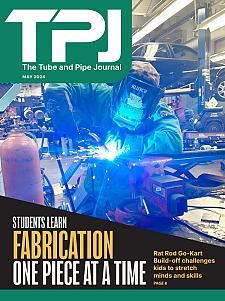
The Tube and Pipe Journal became the first magazine dedicated to serving the metal tube and pipe industry in 1990. Today, it remains the only North American publication devoted to this industry, and it has become the most trusted source of information for tube and pipe professionals.
start your free subscription- Stay connected from anywhere

Easily access valuable industry resources now with full access to the digital edition of The Fabricator.

Easily access valuable industry resources now with full access to the digital edition of The Welder.

Easily access valuable industry resources now with full access to the digital edition of The Tube and Pipe Journal.
- Podcasting
- Podcast:
- The Fabricator Podcast
- Published:
- 04/16/2024
- Running Time:
- 63:29
In this episode of The Fabricator Podcast, Caleb Chamberlain, co-founder and CEO of OSH Cut, discusses his company’s...
- Trending Articles
Zekelman Industries to invest $120 million in Arkansas expansion
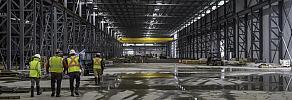
3D laser tube cutting system available in 3, 4, or 5 kW
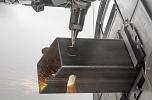
Corrosion-inhibiting coating can be peeled off after use
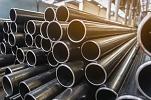
Brushless copper tubing cutter adjusts to ODs up to 2-1/8 in.
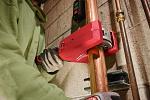
HGG Profiling Equipment names area sales manager

- Industry Events
16th Annual Safety Conference
- April 30 - May 1, 2024
- Elgin,
Pipe and Tube Conference
- May 21 - 22, 2024
- Omaha, NE
World-Class Roll Forming Workshop
- June 5 - 6, 2024
- Louisville, KY
Advanced Laser Application Workshop
- June 25 - 27, 2024
- Novi, MI
























